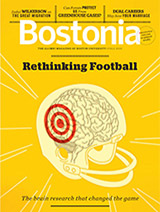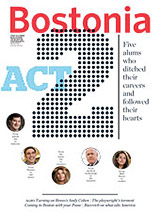The key question, at least for Howard Eichenbaum’s son, was this: will it get you Red Sox tickets?
The query came on learning that his father had joined George Washington, Ben Franklin, and centuries of “thinkers and doers” who have been elected to the American Academy of Arts & Sciences. Eichenbaum, a College of Arts & Sciences psychology professor and director of BU’s Center for Memory and Brain, was to be inducted in October into the 235-year-old academy. Members contribute to its research and publications.
Eichenbaum has spent his career probing how the brain warehouses and summons memories. Being tapped for a group that also has included Ralph Waldo Emerson, Daniel Webster, and Martin Luther King, Jr. (GRS’55, Hon.’59) left him “stunned, and indeed, very honored.”
Among this year’s 197 inductees are Tony Award–winning actors Audra McDonald and Christopher Plummer; singer-songwriter Judy Collins; former Homeland Security director and current president of the University of California system Janet Napolitano; and lesser-known but leading figures in academia, the arts, business, journalism, government, and philanthropy.
His studies, Eichenbaum says, “have revealed memory abilities in animals that parallel those in humans, such as the distinction between conscious recollection of an experience as compared to mere familiarity for recently experienced events, and the ability to organize related memories and use memories to solve novel problems.”
He has demonstrated that these abilities in both animals and humans depend on the part of the brain called the hippocampus. “I have characterized how memories are encoded and organized in the activity of neurons within the hippocampus, providing a preliminary understanding of the memory code in the brain,” says Eichenbaum, who in September was named a William Fairfield Warren Distinguished Professor, the highest honor bestowed on senior faculty members actively involved in research, scholarship, and University civic life, as well as teaching. “I believe these studies have provided insights into the nature of the memory code. I hope my findings turn out to be of importance for understanding how memory is challenged in aging and mental disorders, and of potential value for developing new treatments for memory disorders.”
A list of this year’s electees is here.













































Related Stories
BU’s Howard Eichenbaum Dies at 69
CAS professor conducted groundbreaking research in the science of memory
Two New Warren Professors: Robert Pinsky and Howard Eichenbaum
Poet, brain researcher receive highest faculty distinction
The Right Memory at the Right Time
Complex dialog across brain regions helps us retrieve appropriate information
Post Your Comment